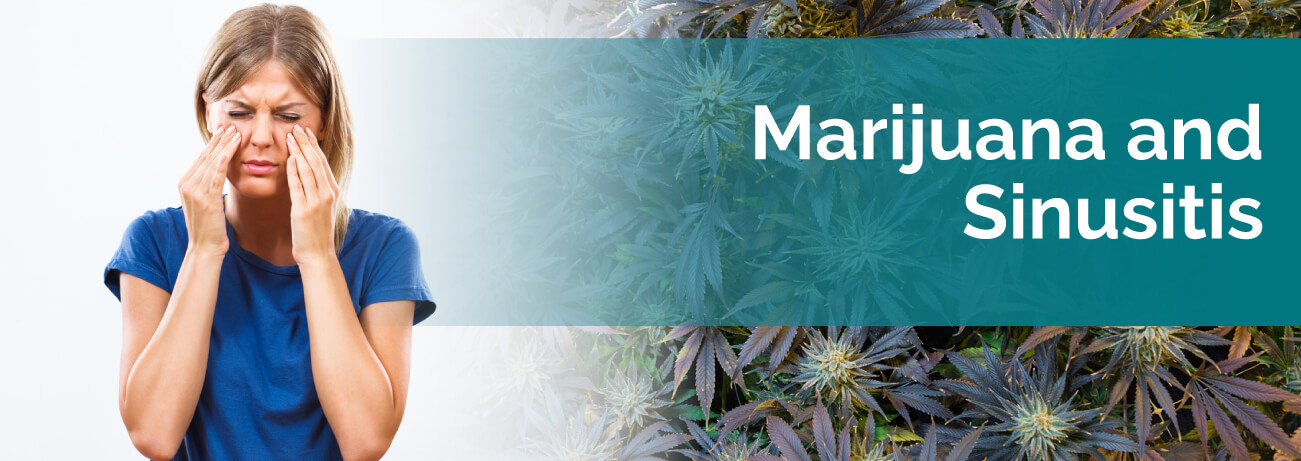
Sinusitis is a painful condition that can either be acute or chronic. You may have been unknowingly suffering from sinusitis if you’ve ever felt as though you’ve had a cold that just wouldn’t go away. In this article, we look at what sinusitis is, the symptoms to expect, the current treatments, and their side effects. We also take a look at how medical marijuana can help you if you have a sinusitis diagnosis.
Your sinuses are hollow spaces behind your nose, around your eyes, and inside your cheekbones. They contain the mucus that supports your body to filter, warm, and moisten the air you breathe. You can end up with a sinus infection if something blocks this mucus from draining effectively.
If you have sinusitis, you experience thick nasal discharge, nasal congestion, cough, and facial pressure. These symptoms can be painful and difficult to get respite from. Additionally, you may feel groggy, and breathing through your nose can be difficult.
There are several different types of the condition, but acute sinusitis and chronic sinusitis are the most common.
An immune system deficiency, infection, nasal polyps, a fungus, or a deviated nasal septum can lead to sinusitis.
There is no recorded history of the first person to ever suffer from the condition. Much like the common cold, sinusitis has been found in humans likely since our time on earth began.
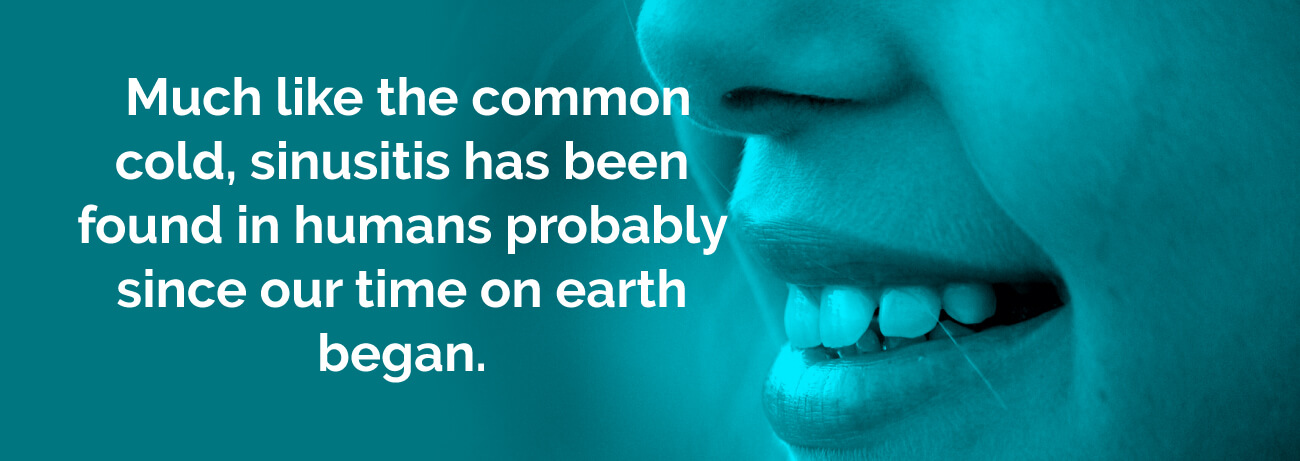
Look out for the following if you suspect you have sinusitis:
You may also experience:
You might have acute sinusitis if you present with at least two or more of the above symptoms or if you have thick yellow or green nasal discharge.
You may have the following symptoms for at least 12 weeks or more:
You may also have dental pain, headaches, and bad breath. Feeling abnormally tired is also a sign of chronic sinusitis. Remember, though, some many illnesses and conditions have similar symptoms. See your doctor for an accurate diagnosis.
Sinusitis can cause you a great deal of facial discomfort. You may have sore eyes, ears, and a painful sinus headache you just can’t seem to shake. The pain can make it hard to get a good night’s rest. So, on top of the tiredness you feel already from being ill, you feel even more exhausted.
If you have chronic sinusitis, you might have to stay off work for weeks or even months, which could then lead to isolation and financial stress. You feel weary and lethargic, which can cause depression. If you have other allergies, this may exacerbate those problems.
If you’re suffering from sinusitis and feel conventional treatments are not as effective as you need them to be, medical marijuana for sinusitis could help.
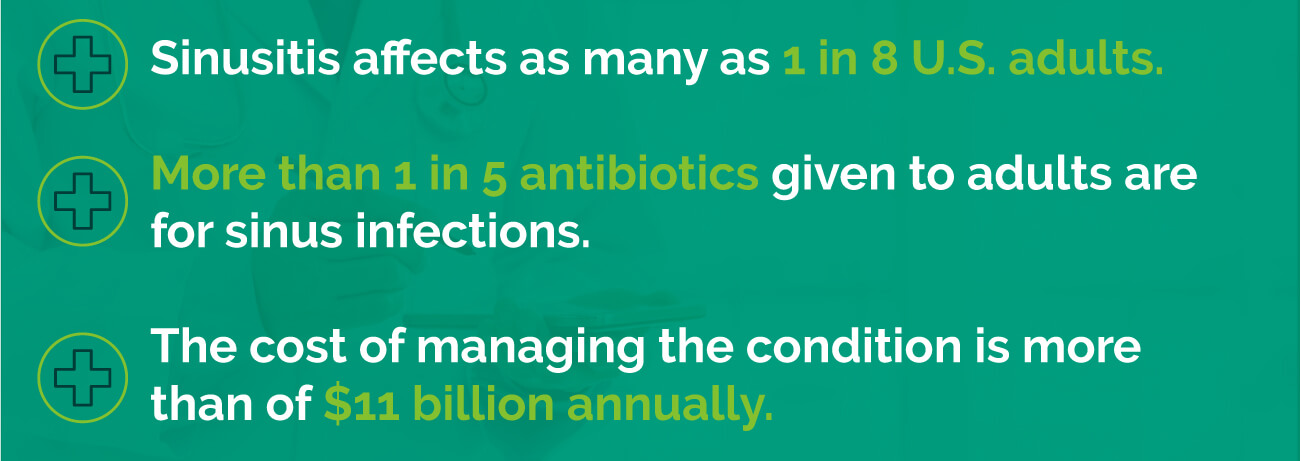
The overall goals of treating sinusitis are to:
There are a few ways to reach the goals of treating sinusitis:
Symptom-Relieving Treatments: There are quite a few common options to help relieve sinusitis symptoms, but they don’t necessarily heal an infection. These include:
Antibiotics: A course of antibiotics may be necessary if you have a bacterial infection. Unfortunately, these medications aren’t always powerful enough to get rid of sinusitis. You could also develop a resistance to them over time. Another negative is that antibiotics often produce side effects such as rashes, diarrhea, vomiting, and stomach upsets.
Immunotherapy: You may be advised to have immunotherapy (allergy shots) if your sinusitis is brought on by allergies. Doing this should help reduce your reaction to specific allergens. It’s hoped that your condition will then improve.
Surgery: You may be offered endoscopic sinus surgery if your case of sinusitis is severe and resistant to medications and treatments. A doctor explores your sinus passages with an endoscope. If they find an obstruction, they may use instruments to remove it or to shave away any nasal blockages such as polyps. They could also elect to enlarge your sinus openings for better drainage.
Medical marijuana: Cannabis can be used to help improve breathing, relieve headaches, and reduce the pain associated with sinusitis.
Corticosteroids may help treat your sinusitis. However, as we mentioned earlier, these drugs come with a variety of potentially adverse side effects. Oral corticosteroids are particularly worrisome as they affect your whole body rather than targeting one particular location.
When you inhale corticosteroids, a little of the drug may stay in your throat and mouth rather than reach your lungs, potentially resulting in:
You may find you experience temporary side effects after a corticosteroid injection, including:
The side effects above may make you leery of taking corticosteroids for sinusitis, whether they are in the injected or inhaled form. Read on to find out more about how medical cannabis for sinusitis can help relieve your symptoms naturally.
Marijuana has been used medicinally for centuries. Thankfully, the stigma associated with cannabis is now diminishing as many states legalize medical cannabis for qualifying conditions.
Research has shown cannabinoids like tetrahydrocannabinol (THC) are extremely effective and powerful antibiotics. They could be the key to halting antibiotic-resistant bacteria, like those found in chronic sinusitis, in their tracks. This is an exciting concept that could eventually mean by using medical marijuana, you can go on to live a normal life free from medications and their side effects.
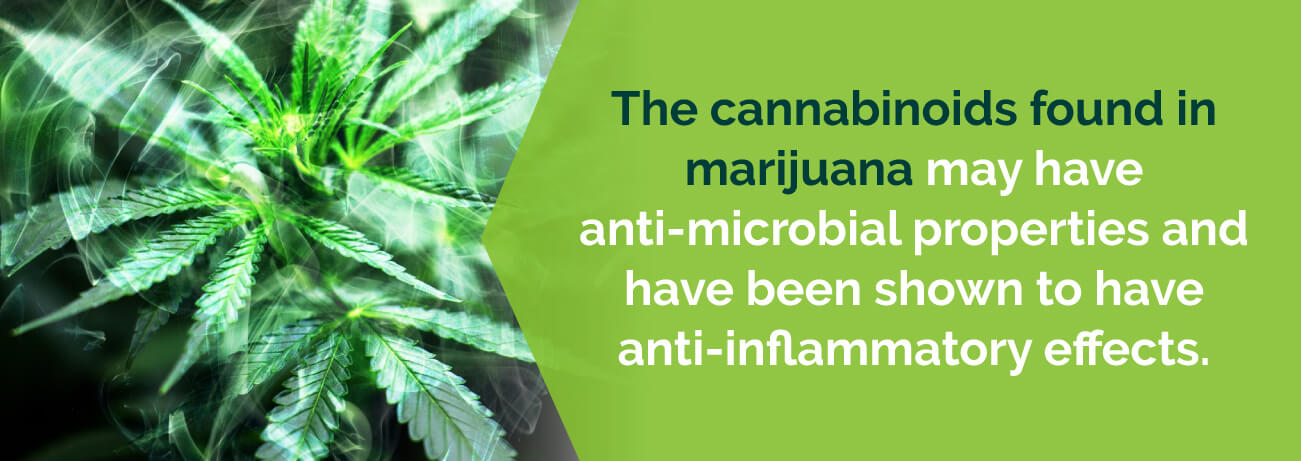
The cannabinoids found in marijuana may have anti-microbial properties and have been shown to have anti-inflammatory effects. Smoking cannabis is not the best route if you have sinusitis as your breathing is already affected, so edibles, tinctures, and other non-smokable products like CBD (cannabidiol) may be more appropriate. Speak to your medical marijuana doctor as to which form is best for you.
If you’re looking for a natural way of managing sinusitis, you can use marijuana safely without worrying about the harmful side effects associated with many medications. Cannabis can help to:
Find A Doctor Find A Dispensary
When it comes to congestion, expectorants are the favored medication. Thus far, medical marijuana has not been found to serve as an expectorant. However, medical marijuana has been shown to be a bronchodilator, which can help individuals who have sinus problems breathe a little easier. The buildup of mucus, sore throat, and postnasal drip can make it hard to breathe.
Of course, you should not smoke medical marijuana if you’re having difficulty breathing. A physician can suggest a better method of ingestion such as eating the medication or using a vaporizer.
Medical marijuana can have a similar effect as codeine in that it can relieve as much pain as codeine in cancer patients, according to one study. Many pain relievers are not successful in relieving headaches, but that is not the case for marijuana. Individuals with some of the most painful headaches possible — migraines and cluster headaches — have had positive results using medical marijuana to relieve their headache pain.
As mentioned above, medical marijuana is an analgesic. It can relieve nerve pain, headache pain, muscle pain, and more. Trials have shown it can reduce dependency on opiates by replacing their pain-relieving effects. It relieves pain in chronic pain sufferers, and it can even provide relief for treatment-resistant pain. Sinusitis can cause pain in the nose, face, throat, ears, and head, which medical marijuana can help with.
It bears repeating that alternative methods to inhalation should be discussed with a doctor to reduce the risk of further irritating the throat and sinuses.
One area of study right now in medical marijuana research regards medical marijuana and inflammation, particularly in Crohn’s Disease. There is evidence medical marijuana can relieve inflammation in individuals with digestive disorders.
There is also testimony by marijuana users that it can relieve skin inflammations and other related ailments. Since inflammation accounts for some of the pain and discomfort associated with sinusitis, relief of that inflammation with medical marijuana can help relieve the other symptoms.
So, now you know more about marijuana and sinusitis, but you may wonder what strains would best help. It’s a good idea to talk to your marijuana doctor or a knowledgeable budtender for advice. To help you get started in the meantime, we’ve compiled this list of strains of cannabis for sinusitis that could help.
The following strains are excellent for helping open up your airways:
Suitable strains for treating pain include:
Using cannabis to treat sinus inflammation is both natural and effective. Some strains for treating inflammation are:
To make an educated decision about how to consume medical cannabis, it helps to be aware of the various methods of delivery.
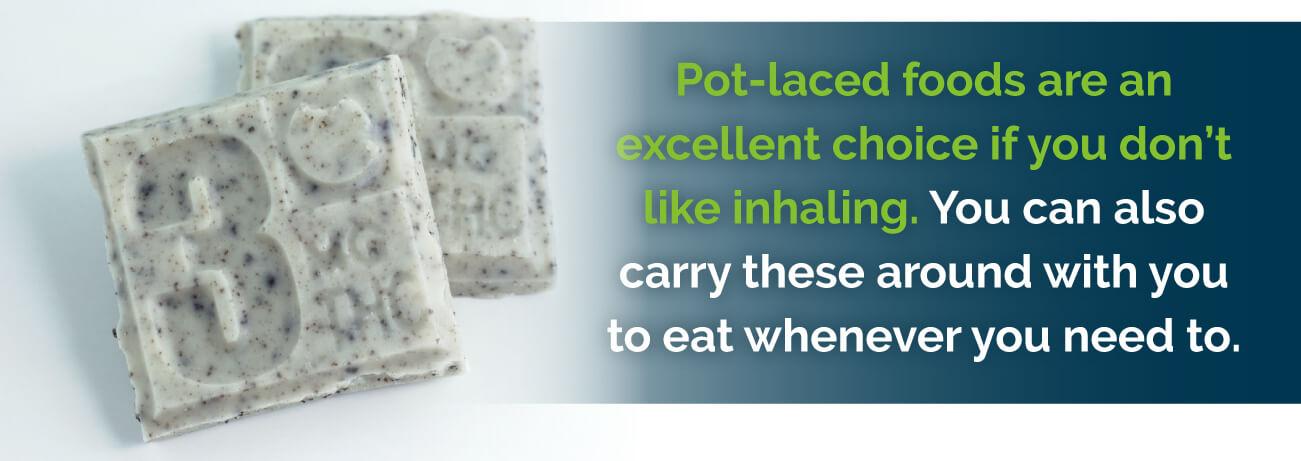
If you’re battling with chronic or ongoing sinusitis, ask your medical marijuana doctor for more advice on how cannabis may be able to help alleviate the symptoms.
You may have tried a host of different medications and treatments for sinusitis to no avail. If your sinusitis is not responding well to conventional antibiotic treatments and you believe you can benefit from the use of cannabis, we will help you find relief for your sinusitis. Search for a medical marijuana dispensary or doctor today to find natural symptom relief from sinusitis. It’s time to take back control of your health.
Find A Doctor Find A Dispensary
The content on this page is for informational purposes only and is not intended to be professional medical advice. Do not attempt to self-diagnose or prescribe treatment based on the information provided. Always consult a physician before making any decision on the treatment of a medical condition.